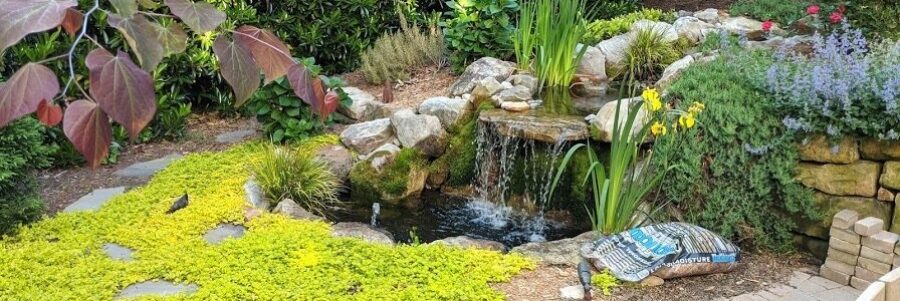Recently, I noticed that many people find our website by searching on the term “zen garden.” This is not surprising, as many folks are turning to gardening and other hobbies they can pursue safely during this time of pandemic and social distancing. I can’t say for sure what they mean by that phrase, but my first guess would be the traditional rock garden or miniature, stylized landscape.
As I thought about this, I realized my concept of a zen garden is a bit different; that I focused on the word “garden” as a verb, rather than as a noun. If you think of a garden as a place where something is being cultivated, then what is being cultivated in a zen garden? Is it a plant, a landscape, a feeling? For me, it’s a place to cultivate samadhi in particular, but in a broader sense also my practice in general.
My Zen Garden
I have a specific little garden spot where I like to meditate. It’s a garden in the traditional sense, with landscaping, attractive plants, and a water feature, with a little brick patio by the waterfall where I spread my blanket and seiza bench to meditate. I love sitting there, finding the ambience to be very conducive to zazen — the dappled shade and natural textures invite an unfocused gaze, and the sound of the water provides a comforting white noise that soothes my tinnitus.
At the same time, it provides ample opportunity to learn to sit with what is — the sounds of birds and neighbors, insects and other visual distractions, heat in the summer and cold in the winter, even the occasional biting mosquito. As with any meditation spot, it is the universe in microcosm — a place where we learn to find samadhi in the midst of samsara.
Thinking again about “garden” as verb vs. noun, my wife and I approach it rather differently. I think she sees it more as a noun — it’s really her garden, she designed it and had it built, and she spends more time there than I do. She enjoys it primarily by being there, sitting there to read, making a phone call, watching the fish, or simply enjoying the scenery. I enjoy meditating there, but most of the time I spend in the garden is spent working on the garden rather than sitting in it.
Work Practice
In fact, I consider working on the garden as an intentional way of bringing the mindfulness developed on the cushion into the broader world. I spend a good deal of time weeding, pruning, mulching and composting. Though that sounds like work, I enjoy doing it and I’m quite certain that activity forms a significant, broader aspect of my zazen practice.
I was very fortunate to meet John Daido Loori roshi and attend a retreat with him at Zen Mountain Monastery. His teachings have had a significant impact on me. Of particular relevance here is his perspective on “work practice”:
Work Practice is a reminder that our spiritual practice must move off the cushion and translate into the sacred activity of living and working in the world. … Starting with simple, repetitive tasks, and gradually increasing their complexity, we learn to see how our minds respond to the task at hand.
Zen Mountain Monastery website – on “The Eight Gates of Zen”
Your Garden Is Part of a Larger Environment
Any aspiring gardener quickly learns that trying to fight nature, to try and create the “perfect” garden, is a losing proposition. The natural world is far more complex than we can control and quickly teaches us that trying to do so is a futile task. Instead, it’s far easier to learn to build your vision in harmony with the environment — but that entails deeply seeing your environment, understanding how it works, accepting it, and working with it.
We are quite pleased that we have created a very healthy little ecosystem in our garden, with a broad variety of flora and fauna, including fish and dragonflies that are delightful to watch, frogs that serenade us at night, and beautiful plants and stones. However, that healthy ecosystem also looked like a perfect home for ‘big Bertha’, a snapping turtle that has moved in. She loves eating the aquatic plants, and we suspect she is also snacking on the snails, and the frogs are suspiciously quieter now…
Much as she is “disrupting” our vision of what we want the garden to be, we are not chasing her out or harming her; we are simply watching and learning, trying to adapt. She took seven years to find this spot, maybe she will move on next year. We have had more frogs some years, fewer others; we’re not sure why. The only thing we know for certain is that next year won’t be exactly like this year.
Enjoy Your Garden
I think that is precisely why I find gardening so peaceful — because it is a perfect lesson in learning to accept what is, to understand and accept the cycles of change. That may sound oxymoronic at first pass, but it makes perfect sense to me — every season is different, but seasonality never changes. There is great peace in accepting impermanence.
It is also a great way to practice seeing beauty in all things. It’s cliche to say so, but I absolutely do see beauty in mulch and compost, not only in knowing that they will support blooms in the spring, but in and of themselves. The thorns on the roses, the snapping turtle in the koi pond — they are all part of the same picture.
Cultivate Your Practice
I’m not saying everyone should go play in the dirt — gardening may not be your thing. However, I encourage you to find other ways to cultivate your practice — whether through art, exercise, or any one of many other methods. When done mindfully and with “right intention”, almost anything can be practice.
To go back to the people who are searching for a zen garden — I hope they find what they are looking for, and what they find helps them to cultivate their practice, their path through this pandemic and other aspects of samsara.









